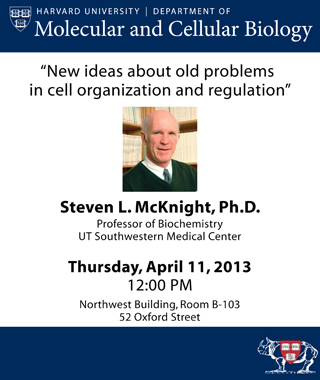This year’s Bloch Lecture will be given by Steve McKnight, Chairman of the Department of Biochemistry at the University of Texas Southwestern Medical Center. The title of his lecture is “New Ideas about Old Problems in Cell Organization and Regulation.”
One of the Nation’s most distinguished biochemists, Steve McKnight has made seminal contributions across an astonishingly broad spectrum of biological problems. Among the highlights are his breathtaking images of RNA synthesis and chromatin replication in Drosophila embryos, his pioneering analysis of the transcription of the Herpes Thymidine Kinase Gene, his invention of linker scanning to discover eukaryotic transcriptional control signals, his groundbreaking analysis of the VP16 viral activator protein, his discovery of the Leucine Zipper family of transcription factors, his discovery, purification and characterization of transcription factors C/EBP and GABP, his demonstration that the DNA-binding activity of circadian Clock proteins are influenced by NAD cofactors, his contributions to the concept that transcriptional regulatory proteins from yeast to mammals can be entrained by metabolic signals, and his pioneering contributions to our understanding of RNA granules, the subject of his lecture.
Steve McKnight received his BA from the University of Texas, graduating summa cum laude, and his PhD from the University of Virginia under the mentorship of legendary electron microscopist Oscar Miller. He then became a postdoctoral fellow with Don Brown before joining the Staffs of the Carnegie Institution of Washington and the Fred Hutchinson Cancer Research Center. McKnight subsequently helped found the biotech start-up Tularik, Inc, serving as its first research director before moving to the University of Texas Southwestern Medical Center. Among his many honors are: the Eli Lilly Award of the American Society for Microbiology, the Newcomb-Cleveland Award of the American Society for the Advancement of Science, the Monsanto Award of the National Academy of Sciences, the NIH Pioneer Award, and election to the National Academy of Sciences and the American Academy of Arts & Sciences.
Steve stands out not only as a scientist but as human being. A Texan through and through, he is known for his athleticism, heroism, generosity, integrity, leadership and wisdom. Steve was a star quarterback and tennis player in high school. During the Vietnam War, Steve served as a decorated member of a tank unit, winning the Army Commendation Medal for sustained acts of heroism. He played a key role in the remarkable Life Sciences Research Foundation, whichpartners with pharmaceutical companies to award outstanding young scientists postdoctoral fellowships that provide both stipend and research support. At UTSW, he created the McKnight Prize, which recognizes undergraduates who have done outstanding research, to honor his parents. As Chairman of Biochemistry at UTSW, he implemented a vision of recruiting and engaging organic chemists and biochemists in the same Department, creating a unique culture that fosters cross-disciplinary collaboration. Finally, he is a role model and source of wisdom to young scientists, as exemplified by his provocative, 2009 essay in Cell “Unconventional Wisdom”, which is highly recommended to all those reading this brief biography who are still young at heart.
By Jim Henle
Konrad E. Bloch was an outstanding scientist who helped shape the discipline of biochemistry in its formative years. One of the founders of biochemical studies at Harvard, he was part of the pioneer generation that included George Wald, Paul Doty, John Edsall and Frank Westheimer. Best known for his studies of cholesterol, he was awarded the Nobel Prize in Medicine or Physiology in 1964 (shared with Feodor Lynen) for investigations in the mechanism and regulation of cholesterol and fatty acid metabolism. Especially noteworthy were the studies on the biological synthesis of the molecule and, according to the Nobel Prize website, “on various aspects of terpene and sterol biogenesis…enzymatic formation of unsaturated fatty acids and…in various aspects of biochemical evolution.”
Arriving at Harvard from the University of Chicago in 1954, he was appointed Higgins Professor of Biochemistry, a position he held until his retirement in 1982. He was part of the core group at Harvard that founded the Committee on Higher Degrees in Biochemistry. With the somewhat later arrival of James Watson, Matthew Meselson, Walter Gilbert, Mark Ptashne and Guido Guidotti, Harvard had achieved a remarkably dynamic and productive core group in biochemistry and molecular biology, of which Dr. Bloch was a signal part. The late Dean Jeremy Knowles described him as “a marvelously perceptive biochemist and a wise, generous and cultivated man who forged the connections between chemistry and biochemistry. He was one of that distinguished line of European biochemists whose deep understanding of metabolism laid the chemical foundations of today’s biology.” [quoted in Harvard Gazette, Oct. 19, 2000]
Dr. Bloch was born in Neisse, then part of Germany, in 1912; he was racially excluded from his studies at Munich in 1934 upon the Nazi advent to power. His subsequent odyssey began in Switzerland, and he was spared a likely fatal return to Germany by the intervention of John Anderson, a Yale biochemist, who helped him with a visa to the US. In America, his studies resumed at Columbia; after a brief stay in Chicago, he came to Harvard.
His work was widely recognized; in addition to the Nobel, he received the US National Medal of Science, and many other awards and honorary degrees. In addition to his scientific output, he wrote intriguing popularizing works such as “Blondes in Venetian Paintings, the Nine-banded Armadillo, and Other Essays in Biochemistry”. He died in 2000, at the age of 88. In 1986, the annual Konrad Bloch lecture was inaugurated in his honor.
The author wishes to express his gratitude to Prof. Guido Guidotti for reviewing the text for accuracy.
The Bloch lecture, sponsored by Pfizer, honors Harvard faculty member and Nobel-prize recipient Konrad Bloch (1912-2000), a pioneer in the field of cholesterol and lipid metabolism.


